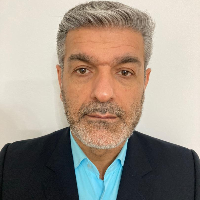The analysis of the archetype "Mask" in the anthology Malameh Men al- Wajhe al-Ambizu-Ghelisi by Mohammad Afifi Matar according to Carl Jung's theory
The term analytical psychology, which is one of the new terms in psychology, was first used by the famous European psychiatrist, Carl Jung. As a prominent psychologist, he looked deeply into the layers of the psyche and used this term to distinguish his theories and treatment method from the psychoanalytic theory of Sigmund Freud. With the passage of time, analytical psychology went beyond the field of psychology due to its efficiency and entered the field of literature, and the works of many poets and writers were criticized in order to know their views and thoughts, and a solid bridge of communication between literature and psychology was formed. As a result of the relationship between them, a new critique was created, the basis of which is the psychological critique of Jung's archetypes, and its origin is the collective unconscious learning of mankind, which has been stored in the unconscious mind of man for many years; Therefore, it is called archetypal criticism or mythic criticism, which is regarded as one of the new fields of literary criticism, and for the first time it was formed in Western literature, and with the passage of time, it was also noticed in the Middle East. The criticism of the archetype, which was first raised in 1934 based on Carl Jung theory of the unconsciousness self with the publication of archetype designs in poetry, by Maud Bodkin; It is one of the literary criticisms that, by using the theory of Carl Jung, criticized and psychologically analyzed the collective unconscious mind of mankind, and thus, new horizons in the way of criticizing literary works were presented to the researchers, and many patterns for the psyche of every human being, such as: Mask, shadow, anima, animus and self were defined. The mask is one of his important archetypes, which is very important for self-realization and personality development, and it actually refers to the external aspect of a person's personality, which is shown to the society, and is indicative of a kind of psychological desire; That is, the person wants to hide his individual nature from others, which is actually the person's external false personality, not his true personality; because the society and the difficult conditions governing it impose such a defense mechanism on the individual, which makes them feel safe and comfortable. Muhammad Afifi Matar, a contemporary Egyptian poet, is one of those poets who, considering the severe political and social suppression prevailing in the Arab society, inevitably took refuge in his collective unconscious and turned to this psychological technique to express his critical opinions. His critical poems arise from his concern about the deplorable state of society and opposition to the wrong policies of the rulers, and by exploring and studying his poems, one can understand its hidden aspects; because, on the one hand, his poems have a direct connection with the collective unconscious, and on the other hand, they have a significant effect on the awakening of the Arab society against the dictators and colonialists. Afifi Matar is one of the most diligent Arab poets, who has never backed down from advancing and realizing his goals, even during his exile, and considering that his poems have political content, he tried to put masks on his own face, and the face of the rulers, his country, and the free men. to show them as they are not, or introduce them as less or more than what they are, and deepen everyone's perspective towards them.
Due to the fact that this archetype originates from human nature and is one of the common features of many people, especially poets, it usually manifests itself in literary creations and finds a more objective expression in poetry.
Therefore, the present essay investigates the archetype of the mask and its manifestation in different forms and how its positive and negative consequences are manifested in the poems of the poet mentioned in his Divan Malameh Men al- Wajhe al-Ambizu –Ghelisi, so that in addition to discovering the beauty of this valuable work, it can reveal how adaptable this archetype is according to Carl Jung's opinions, and find out how this psychological technique has manifested itself in the poet's collective unconscious, according to Jung's opinions.
The result of the research shows that on the one hand, considering the political and social suppression conditions prevailing in the Arab society and the poet's effort to enlighten and raise awareness among the people, this psychological technique can be used extensively in a beautiful way in the form of negative masks to reveal the acts of oppressors and also in positive and negative ways, for other purposes, including the homeland, they have an outstanding crystallization, and it shows the adherence and commitment of the poet who, by using these masks, draws his responsibility and conscientiousness, and uses their mental strength to fulfill his social roles and responsibilities, and on the other hand, generally there is no practical solution to overcome the negative consequences of such masks; Rather, it is suficed to expressing the subject; But it is clear that the poet has fulfilled his responsibility to a certain extent in order to make the society understand and the youth aware of the oppression and suppression in the society and to awaken them to struggle with oppression and achieve freedom.
-
Psychological analysis of poetic colors in the poetry of Mohammad Afifi Matar based on Max Luscher test
Sougol Askari Kaseb, HamidReza Mashayekhi
Iranian Association of Arabic Language and Literature, -
An Analysis of Textual and Situational Context of the Signification Level in Qāsiah Sermon
Hamid Reza Mashayekhi *, Saeedeh Zareh Ataqsara
Journal of Religious Literature and Art Studies,



